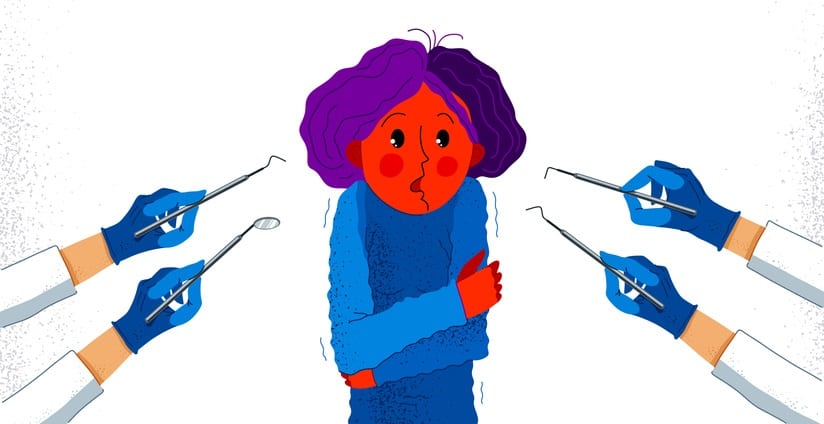How to stop worrying about the dentist
Your pulse is pounding. You’re sweating. You can feel your stomach twisting and contorting into poses that would make an Olympic gymnast jealous. And you’re not even in the dentist parking lot yet.
If this describes you, you’re not alone. Up to 20% of Americans put off going to the dentist out of anxiety or fear. And like many phobias, the fears and anxieties may feel real and are no laughing matter, but they are often irrational. Regular dental visits are crucial to not only a healthy smile but a healthy body. Research shows unhealthy teeth and gums can increase the risk of developing heart disease. There’s also a strong link between diabetes and cardiovascular disease, and evidence people with diabetes can benefit from dental treatment. Having a healthy mouth can also significantly reduce the chances of oral infection and tooth loss. So if you’re worried about your health, visiting a dentist on a frequent basis is an excellent preventive measure.
Sometimes thinking rationally about the health benefits of seeing your dentist are not enough. Many people who experience phobias feel powerless to stop irrational thoughts or do anything about them.
We want to assure you, for those who fear the dentist, we can help put your mind at ease. At Harkins, Hancock & Johnston Dentistry we create a calm, peaceful, and patient friendly environment without any judgment. But don’t just take our word for it. Schedule a visit today to come in and just chat. You can even take a walk around our serenity garden and hang out with the ducks. We will never do anything to make you uncomfortable, and it’s often helpful to have a private conversation in person so we can explain how to limit or completely remove your fears.
For the rest of the skeptics out there, let’s address some of the most common fears people have when thinking about seeing a dentist.
Pain
Pain is one of the most common reasons for avoiding the dentist. We often hear patients with dental phobia tell us they had an unpleasant childhood experience or heard scary stories from a family member. But here’s the reality: Dental medicine has advanced well-beyond the medieval methods of some practitioners from yesteryear. Long gone are the days of pulling teeth or drilling without reason or anesthesia. In fact, removing teeth and drilling are often unnecessary with good dental care. Thanks to the many advances in dentistry made over the years, most of today’s dental procedures are less painful or even completely pain-free.
Needles
No one likes needles, but some people are truly terrified of them. If that’s you, we can help. Pain is non-existent with good technique and proper equipment. We can apply a special numbing gel to your gums before using a local anesthetic. It works, and when left on long enough, the soft tissue will be so numb you won’t feel the needle at all. We’ll talk you through every step and make sure you’re always comfortable. If you suffer with generalized needle phobia, we can use nitrous oxide to help you relax. Alternatively, we can also provide an oral anti-anxiety medication for a more relaxed state of mind. Empathy goes a long way, and we often find patient fears melt away after carefully explaining each step involved in a procedure and reducing or eliminating the possibility of pain.
Drilling
This one’s common and we admit, it’s not exactly the most pleasant sound, but it doesn’t have to be scary. Some people who fear the drill had painful experiences in the past simply because they weren’t properly numbed. There’s no excuse for this. There should never be any pain when a tooth is correctly numbed, only very light pressure and some vibration. Once you’re conditioned to associate the sound of the drill with pain, we understand it can be difficult to unlearn and relax.
You may find things have changed since your last dentist visit however. Dental equipment is getting quieter and electric drills are much softer than traditional ones. We can also help put your mind at ease with headphones and soothing music to block out any sounds that make you uncomfortable. We also don’t have a problem with patients bringing noise-canceling headphones or their own music, as long as you can easily pause it if we need to communicate. Bringing a blanket from home can also help you feel relaxed. Stress balls are another helpful tool and can be squeezed with one or both hands to reduce stress and tension.
Again, before any dental work begins we will walk you through every step. Understanding you may feel anxious can help us come up with a predetermined stop signal if you ever need a break or feel you need more numbing.
Embarrassment
Many people have experienced embarrassment from friends, family, or co-workers over teeth. If you no longer feel comfortable smiling or talking to others, it can become a vicious cycle and can lead to poor oral health.
If you can relate, we want you to know you should never feel ashamed or embarrassed of your teeth. Dentists and hygienists are highly experienced professionals and do not judge people or have a reason to embarrass anyone. Our job is to make sure you are safe and have a healthy smile, and that’s really all we think about.
At Hancock and Johnston, we strive to make your appointment a positive experience. Bottom line: We are here to provide support, information, and options–not tell you what to do or make judgments.
Gagging & Choking
Some people have a hard time breathing through their nose, have dry mouth, or take medications that can cause nausea. Other times a sensitive gag reflex is due to psychological factors such as anxiety or traumatic past experiences. Either way, it’s important to let us know about this concern so we can address it during treatment.
Some helpful tips to lessen the gag reflex include focusing on breathing through your nose and taking deep, even breaths in and out through your nose. You can distract yourself with music or focus on the TV. We can also apply a topical or local anaesthetic to numb your throat, tongue, or palate and provide treatment in shorter bursts to give you time to swallow and breathe. Plenty of suction helps relieve feelings of choking and we can even apply a special dental dam to help prevent water from going down your throat. No matter your concerns, there are plenty of options we can suggest and steps we can take to help you overcome any fears. A fear of choking or gagging should not prevent you from seeking timely dental treatment.
Relax
Hopefully we’ve helped demonstrate there’s no cause for concern when visiting the dentist. A skilled and understanding dentist can help any patient overcome fears. We don’t judge, we don’t lecture, and we respect your concerns. Seeing a dentist on a regular basis can help prevent cardiovascular issues, gum disease, oral infections, and tooth loss. If you have any questions or concerns, please don’t hesitate to give our practice a call today!

